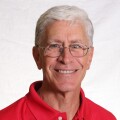I’ve had a lot of titles in my life: husband, father, son, brother, uncle, cousin, student, graduate, writer, editor, coach, volunteer. Never did I think I would add this one: Special Olympics athlete.
Having spent the past 36 years helping to raise our son, Jonathan, who has autism, I have had the privilege of participating in Special Olympics as a swim and golf coach and a volunteer in other sports. The experience has been rewarding on several levels. It has given me valuable time with Jonathan, as well as the opportunity to see him grow and blossom as an athlete and a young man. This year, however, I have an even greater privilege. Based on Jonathan’s ability level in golf, we have been randomly selected to help represent Virginia in the Special Olympics USA Games as a team – athlete and “unified partner.”
Rather than playing one of my usual roles, I will be a member of the team, integrated into the thrill of Special Olympics in all respects. We will march into Opening Ceremonies together with some 5,500 athletes and coaches from across the USA. For a week in June in the Florida heat, we will play alternate-shot golf alongside athletes and partners with similar skill levels. Our Virginia teammates will play sports ranging from basketball to bocce and soccer to softball as part of a remarkable program, one that’s capable of bringing athletes, partners, coaches and volunteers together in support of a common cause.

But first: practice. Suffice to say we are not scratch golfers. It is true that we won gold medals at the Virginia State Games in December, but so did many others. To advance up the ladder to the USA Games, you need some luck as well. The small number of participants are chosen based on how each sport’s vacancies are apportioned among the states, and then by random drawings that give athletes across all skill levels a fair chance to compete against those with similar abilities. That’s how we were selected – basically, out of a hat.
I have battled the game of golf for nearly six decades with little success. For me, the adage that it’s a good walk ruined is physically accurate, if not spiritually true. I’m a duffer, but that has never stopped me from loving the game. The real hero of our partnership is Jonathan. He is a poster child for autism: capable and even exacting in many areas of life, including holding down a job and helping around the house, but with limited communication and social skills. Unlike most Special Olympics athletes when it comes to competition, he appears to care little about winning or losing; that’s how he plays the game! He struggled with team sports during his childhood; playing defense in basketball and soccer never made sense to him. Why stop the other player? Isn’t that mean?
But because Jonathan’s communication and social skills limit him in other areas, his mother, sister and I were determined to make sports a major part of his life. The solution: individual activities. He swims a mean breaststroke and freestyle, as his array of gold, silver and bronze medals shows. He succeeded at downhill skiing until asked to conquer blue, rather than green, trails. At that point, lacking the language to express himself, he sat down atop a steep hill and removed his skis. He speed-skated for years. He skied cross-country style. Beyond Special Olympics, he loves nothing more than working out at our Fairfax County fitness center. He rides his 18-speed bike without incident, as long as someone is nearby to shout out the proper gears. And he walks our dog, Rosie, for miles.
For the past two years, while undergoing various forms of COVID-related lockdown, the glorious game of golf has been his saving grace. He is happiest at the driving range, smacking 6-irons and hybrids in rapid succession. He needs advice when the task turns to chipping and putting, which require delicacy and patience. And on the course, he is just learning the situational awareness that comes naturally to those without developmental or intellectual disabilities. He is prone to addressing the ball without aiming, or to taking a full swing just a few yards from the green. These are the social aspects of the game that we have spent the past few months practicing in hopes of making Special Olympics Virginia proud.
For the winter holidays, Jonathan received a new putter, two dozen golf balls, a huge package of tees, two golf gloves and an illustrated book of instructions. This spring, he added a new golf bag and several new Calloways. There have been scores of trips to driving ranges, chipping and putting greens, and public courses short and long. Of course, double and triple bogeys still outnumber pars. Frustration intervenes with elation. Golf can be an unforgiving game. But Special Olympics – even at the national level, against competitors from 50-plus states and territories – is a very forgiving program.
“If I cannot win,” the athletes’ oath goes, “let me be brave in the attempt.” Jonathan and his fellow Special Olympics athletes are endearingly brave. We will find out in the Florida heat if his dad has half as much courage.
















